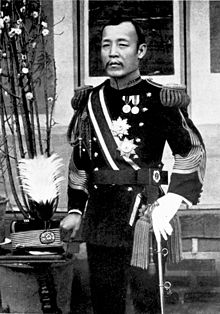Mihn Yong-hwan
| Min Young-hwan | |
 |
|
| Korean name | |
|---|---|
| Hangul | |
| Hanja | |
| Revised Romanization | Min Yeong-hwan |
| McCune–Reischauer | Min Yŏng-hwan |
| Courtesy name | |
| Hangul | |
| Hanja | |
| Revised Romanization | Munyak |
| McCune–Reischauer | Munyak |
| Posthumous name | |
| Hangul | |
| Hanja | |
| Revised Romanization | Chungjeong |
| McCune–Reischauer | Ch'ung-jŏng |
Min Young-hwan (1861–1905) was a minister of the Korean Empire and known as a conservative proponent for reform. He was born in Seoul into the powerful Min clan and committed suicide as an act of resistance against the Eulsa Treaty imposed by Japan on Korea. He was a nephew of Empress Myeongseong. He is remembered today for his efforts on behalf of Korean independence in the waning days of the Joseon dynasty and a statue to his memory now stands near the gates of Seoul's Changdeok Palace.
Min's father, Min Gyeomho (민겸호, 閔謙鎬) was a minister in the Ministry of Finance (Hojo). Min Young-hwan passed the Gwageo examination in 1878 and thereupon entered into government service as a junior librarian in the Royal Library (Gyujanggak).". Min continued to rise through the ranks of Joseon officialdom, holding a succession of posts including a position in the Office of Special Advisors (Hongmungwan 弘文館) and tutor to the Crown Prince. In July 1882 Seoul was shaken by the Soldier's Rebellion triggered by the disgruntled royal palace guards who had not received their wages for several months. During this revolt Min's father was killed. As a result, Min resigned his posts and went into mourning. In 1884, Min reentered public service and was appointed an official of the Board of Personnel (Ijo 吏曹) and successively held various government posts, such as Vice-mayor of Seoul (Hanseong Uyun 漢城右尹). In 1895, Min was appointed as the first ambassador to the United States. However, the murder of his aunt, the Empress Myeongseong, by Japanese troops in October 1895, prevented his taking up the post. In April 1896, Min was appointed special ambassador and sent to Russia to attend the coronation of Czar Nicholas II. After a six month journey Min returned to Korea in late October of the same year. In January 1897, Min was again sent to Europe as Korean envoy to the Diamond Jubilee of Queen Victoria. These journeys served to further convince Min of the necessity of modernization. Upon his return to Korea, Min was an active supporter of the Independence Club, and was interviewed by its newspaper The Independent (Dongnip Sinmun 獨立新聞) .
...
Wikipedia
